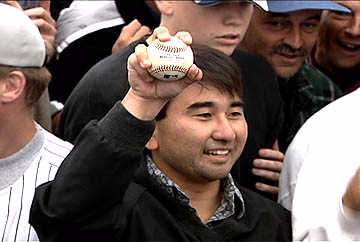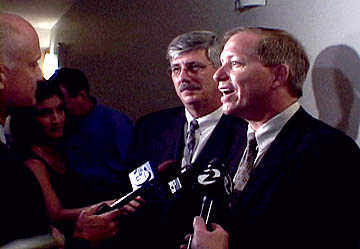Up For Grabs


When Barry Bonds hit his 73rd home run, it shot far into the stands and landed in a crowd of people. Everybody mobbed, and Patrick Hayashi emerged grinning, holding the baseball. It wasn't just a baseball, but a lucrative goldmine. Shortly before, prior home run balls by Marc McGwire, Sammy Sosa, and Bonds himself fetched hefty sums on the auction market. With home run #73, Bonds was moving into uncharted waters. So it was no surprise when footage emerged of a person catching the ball. This person was not Hayashi, but Alexander Popov. Up For Grabs is an engrossing documentary by Michael Wranovics that takes an in-depth look at what happened as a result of this. It basically became two men fighting over a baseball (granted, one potentially worth over a million dollars).
Before he gets into the meat of the issue, Wranovics steps back and provides some interesting context. Particularly Sal Durante, who caught Roger Maris' home run ball. In an interview with Wranovics, Durante says all he wanted to do was to give the ball back to Maris. Maris gave it back to him. How baseball has changed. The home run race brought fans back to baseball after a disastrous strike. Too bad the recent steroid scandal has taken away all of that goodwill. Now, people wanted to catch the ball and sell it to make a fast buck. Which brings Wranovics back to the present. He gives a quick montage of nearly all of Bonds' homers, then spends some time interviewing the lucky people who caught the home runs preceding #73. One guy saw a potential fortune vanish before his eyes as he was giving a press conference and Bonds hit another run. Then comes October 7, 2001.
A television station had a camera trained on the outfield bleachers of Pac Bell Park, and cameraman Josh Keppel was able to obtain footage of Popov catching the ball. Amusing, this became known as the Keppel tape, akin to the Zapruder film that caught Kennedy's assassination. Legal wrangling quickly ensued, as Popov insisted that the ball was his, and Hayashi insisted the opposite. People watched in horror and mock amusement as tensions escalated and the entire thing went to trial. The entire affair was surreal, and both men, especially Popov, a preening media whore, came off looking bad. Hayashi was not very forthcoming with the media, and was captured on tape biting a teenager. Popov glommed onto all the publicity, trying to lengthen his fifteen minutes as long as possible (his ultimate actions late in the film show just what kind of person he was). In other words, his cockiness makes him a perfect villain.
Wranovics talks to nearly all of the associated parties, and all of them are surprisingly candid, even the Superior Court judge who presided over the case. It's a unique opportunity to hear lawyers and especially reporters give their opinions on a story, rather than just a report or sound byte. Underlying this comedy of idiots was a serious legal issue - who did the ball belong to? There are valid arguments on both sides of the issue, but the whole thing was too muddled to come to a definitive decision. Litigation lasted for over year (it ended after the following baseball season) with a decision that makes people want to slap Hayashi and especially Popov. As the trial winds down, the story trucks on, going through even more iterations so bizarre that nobody could think them up. It all adds up to a fascinating look at the culture of greed and how it can really change people.